#if you are able to go to a psychiatrist rather than self diagnosing
Explore tagged Tumblr posts
Text
it’s a 13 year old girl and her ‘am I gay?’ quiz against the world
Also it’s a 16 year old girl and her ‘how can I tell if I am neurodivergent’ quiz against the world
#she was in fact queer#and very much not neurotypical#I really choose the weirdest looking sites to take those tests#only song they think lesbians listen is I kissed a girl by Katy perry truly#weirdly qualified looking ocd tests were way less accurate#just a reminder tho#if you are able to go to a psychiatrist rather than self diagnosing#go#sapphic#am i gay quiz#neurodivergent#wlw#actually ocd#ocd#mental health#those quizzes seem fun now but i took them very seriously at some point
12 notes
·
View notes
Text
i've been diving a lot deeper into adhd symptoms and comorbidities and misdiagnoses and whenever i tell my boyfriend something i learned that sounds like me he responds with something like


#idk he knows me more than anyone bc i can't hide the parts i'm ashamed of from him#last night he was like. yeah EYE think you have adhd but i'm just some guy#idk i'm excited about this not because i want to be Quirky for internet reasons. yknow. but bc i've felt like an impostor of a human being#and i have no sense of self and i can't get myself to do basic tasks and the thought of doing something i don't want to do#genuinely makes me want to throw up/my brain shuts down/i can't think or talk or function to the point where i can't work.#so i can't support myself. so i feel terrible about myself. and i've been in and out of therapy for 20 years and have numerous diagnoses#that have never really felt like they fully encapsulate what's going on. and like. i've kinda just internalized that i'm not as good at#being a person as everyone else because i struggle so so much. like yeah i did well in school but i had to sacrifice literally everything#else to do that. idk how everyone else is managing to have a job and hobbies and friends#i get to pick like. one now. i used to be able to juggle everything to some degree although i felt like i was being careless in all areas#except school. i'm so scared of making mistakes or starting anything or talking to new people or trying new hobbies#because i know it won't interest me more than a couple weeks MAX and i'll feel listless and restless again#and i've come to understand this as part of who i am at my core. i'm just someone who can't commit and isn't reliable or a good friend#i just want so badly for that not to be the case because i want so badly to not be stuck like this#idk im going home to talk to my dad this weekend and just rest because i'm really really not doing well#which is why i'm scrambling to try to figure out what's going on with me because idk how much longer i feasibly can do this#and i might be moving back to the pnw bc therapists in pa don't work with medicaid#and no psychiatrists near me are taking new patients. and i can't work to get on private insurance. but therapists in or do work w medicaid#so idk. again if youre diagnosed w adhd and this sounds not like someone who is consuming social media brain rot content about adhd#but rather someone whose experiences you identify with. please let me know. please please#i am reaching out to professionals also but things move slowly and i'm trying to compile evidence so i don't sound like i'm making it up
9 notes
·
View notes
Text
By now, a majority of Autism researchers and clinicians are aware that the existing assessments for Autism are profoundly flawed.
They know the standard evaluation of Autism is sexist, with assessors excluding women for reasons like wearing makeup, having a boyfriend, being superficially polite, or not being fixated on suitably ‘masculine’ topics like ancient Roman history or barometric pressure.
They know Autism evaluations are racist, deeming Black Autistics “oppositionally defiant” or even “borderline” rather than acknowledging any social alienation or sensory pain they’re experiencing, and believing they must be overstating the difficulty they face in moving through the world.
And they certainly know that conventional Autism measures weren’t designed with adult Autistics in mind. Many of us are still asked to make up stories based on paintings of frogs in a toddler’s picture book, when we sit down for assessments at age 20, or 30, or 45 — because all the evaluation methods were written for young kids.
The data has already proven the far-reaching consequences of using such shoddy measures of Autism. People of color, gender minorities, older adults, and women are diagnosed at later ages, and also go undiagnosed at massive rates.
A growing population of scientists are admittedly interested in fostering a new literature of what they call “patient-driven” Autism research, but they never stop thinking of us as mere patients, the passive receivers of care rather than the leaders of communities and political movements who are the ought to be the primary authors of the studies about us, and the sole determinants of what our desired outcomes should be. Even when they observe that their work could benefit from a greater Autistic perspective, researchers do so from closed rooms, filled with other professionals who are largely not Autistic, wondering amongst themselves what it is that we want instead of learning to quiet their voices and follow our lead.
Though many basically well-intentioned Autism researchers believe that Autism assessments need reform, what neurodiversity really needs is to abandon the diagnostic process altogether. If Autism is a benign, neutral, naturally occurring form of human difference that requires acceptance rather than a cure, then there’s no need to diagnose it as if it were a sickness. And if hundreds of thousands of Autistic women, people of color, queer people, and older people have been able to give a voice to ourselves and find one another without having ever been given a label by a professional, then improved professional labeling is not what we need.
Autistic self-realization is the future of Autism assessment. We hold the collective wisdom, organizing ability, insight, and political power to define who we are. No authority figure should have to sign off on our identities.
Because psychiatrists fail to diagnose such a large percentage of the Autistic population, many Autism researchers now accept self-identified Autistic adults within their subject pool. Within the peer-reviewed journal Autism in Adulthood, self-realized Autistics often make up the bulk of the participant sample, and they have repeatedly been found to be indistinguishable from their formally diagnosed peers.
A growing body of research now also considers the presence of Autism-spectrum traits as qualifying for inclusion in many Autism studies. The data makes it quite obvious that Autistic people exist within all human groups, spread all throughout the world, and that a great many people have experiences in common with us who have not been formally diagnosed. This itself reveals that a formal diagnosis is hardly necessary, and that a psychiatric paradigm of accepting self-identification is inevitable. The researchers are increasingly already doing it.
You can read the full essay for free (or have it narrated to you!) at this link.
498 notes
·
View notes
Text
A detailed explanation from my headcanon that Annabel has ADHD
So I had this six fucking hour trip. On a bus. Alone. And I was bored out of my mind, because sitting around being bored is as close to mental torture as it gets for me.
Fortunately, the light at the end of the tunnel: I was inspired. Away from the burnout I have with fanfics, I remembered that I've mentioned this headcanon several times on Nevermore's Discord and just thought, what better time to talk about ADHD than when I'm having a pretty ADHD moment?
But before I start, there are a few little things that need to be pretty clear on the table:
I'm being a bit hypocritical here: in general, I'm deeply against diagnosing fictional characters for two reasons: first, it's an impossible task to distinguish between character traits and symptoms to such an extent that you can go around forever without coming to a real conclusion unless the author of the work confirms it, and second, even if you have the disorder you're talking about, you can fall into the trap of perpetuating stereotypes or generalizing, thereby invalidating other experiences. So even if the tone of this review sounds very assertive, it is because of my writing style. I am in no way diagnosing Annabel; this is an analysis of her character through the lens of a possible disorder.
In relation to the above, where I point out an event in the comic that can be read as a symptom, I am not reducing it to "this only happens because she has ADHD". You CAN'T reduce a person's personality to "they has a disorder," and when I point out these examples, I'm not doing so with the intention of denying the background behind it, but rather pointing out how, under the magnifying glass of having it, it might exacerbate that behavior.
I am NOT a psychologist, a psychiatrist, or a neurologist: I am a woman with ADHD. One who has done a lot of research on the subject, been in therapy with a psychologist who specializes in the disorder, and talked extensively about it both with friends who also have it and with professionals. But I don't have a career in mental health, I don't pretend to, and everything you'll read below is a mixture of research and personal experience.
You're going to see a lot of "we" or "those of us with ADHD" because, as I said, I have it too, but this is all a generalization made for the sake of flow. The symptoms of this disorder can be expressed in many different ways, and not everyone has all of them (for example, there are some that I don't have, but it would be strange to change the voice of the text just because of that, it makes it harder to read). If you have ADHD and read a symptom and think "hey, I don't get that", that's perfectly normal. Your experience is valid and I don't want to pass it on. But it would be exhausting for me and for the reader to use tentative phrases all the time.
If this text resonates too much with you, I strongly recommend that you see a professional, if you're able, and not self-diagnose: ADHD has many symptoms in common with autism and other neuro divergences, don't risk misdiagnosis.
If you have a different opinion than mine on this subject and want to share it with me, I'll be happy to read it, if I don't answer it's because I forgot (forgive me?). But you can be sure that I will read it.
Anyway, let's get started.
What is ADHD?
According to the NIH (National Institute of Mental Health) website, this is the definition of ADHD:
Attention-deficit/hyperactivity disorder (ADHD) is marked by an ongoing pattern of inattention and/or hyperactivity-impulsivity that interferes with functioning or development. People with ADHD experience an ongoing pattern of the following types of symptoms:
Inattention means a person may have difficulty staying on task, sustaining focus, and staying organized, and these problems are not due to defiance or lack of comprehension.
Hyperactivity means a person may seem to move about constantly, including in situations when it is not appropriate, or excessively fidgets, taps, or talks. In adults, hyperactivity may mean extreme restlessness or talking too much.
Impulsivity means a person may act without thinking or have difficulty with self-control. Impulsivity could also include a desire for immediate rewards or the inability to delay gratification. An impulsive person may interrupt others or make important decisions without considering long-term consequences.
Here is an impression that needs to be clarified: ADHD is more about an inability to regulate attention than a lack of it. A neurotypical person may choose to focus on a task to get it done, we may procrastinate to death because even if we want to, we can't focus on it, or stand there absorbed in it ad infinitum until the house falls down around us (and we may still have trouble noticing). This is understood, Understanding all this, here is the list of Annabel's behaviors that could be interpreted as symptoms.
Hyperactivity
One thing that not everyone knows is that hyperactivity is not about running around like an uncontrolled animal. It can manifest itself in many ways, and there are many types: physical, mental, and even emotional.
In Annabel's case, she seems to be the first two types.
Perhaps due to her difficulty in expressing emotions, it is quite obvious at this point in the comic that her moods are made explicit through gestures: playing with her rings when she is happy or nervous, touching the ribbon around her neck in moments of anxiety, or playing with her hair almost as a default state.
Annabel.
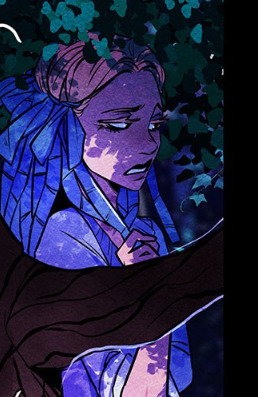
Doesn't.

Sit.
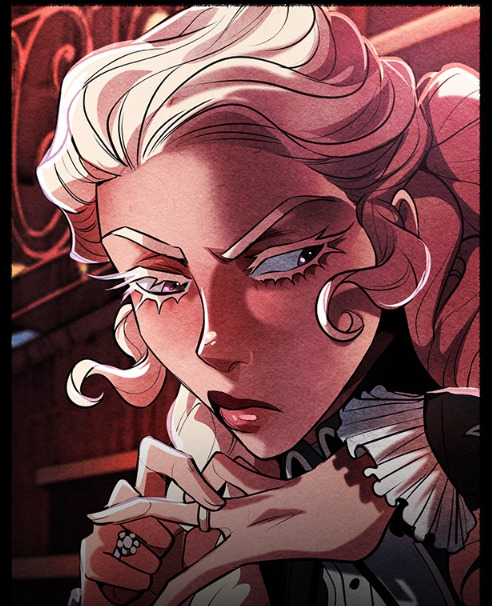
Still.
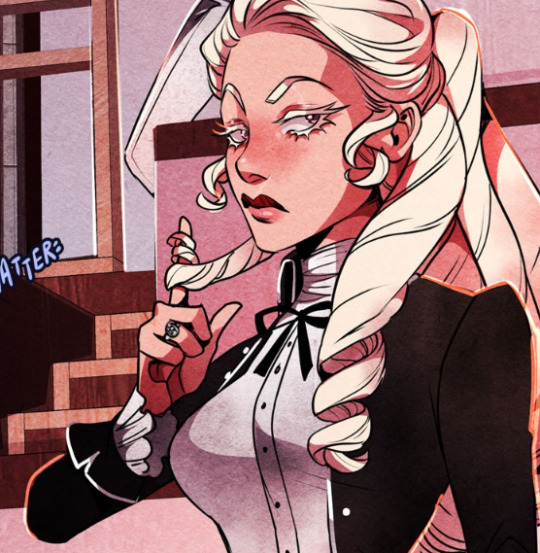
Never.
It is also clear that Annabel is always planning something. Always.
This can be read into the logic of mental hyperactivity: when you have it, your brain just doesn't stop. Ever. And that's something that resonates with this lady.
Emotional Dysregulation
The part of the brain that regulates our moods works…erratically. Not to say it doesn't work at all.
This leads to a painfully common problem in women with ADHD: lack of emotional regulation is seen as drama, and instead of being taught tools to deal with it, we are taught to repress and bottle up emotions.
Annabel has highly internalized this as a defense mechanism. But here's the thing: if repressing emotions instead of learning how to deal with them in a healthy way is harmful, being biologically unable to regulate them can be even worse.
It touches the right nerves, and if you catch us flying low, it can cause explosive outbursts.
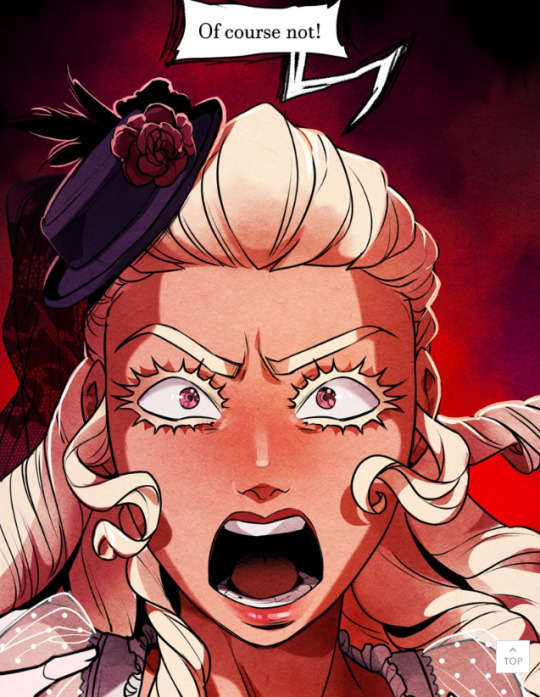
Possibly violent reactions to feeling offended or uncomfortable.
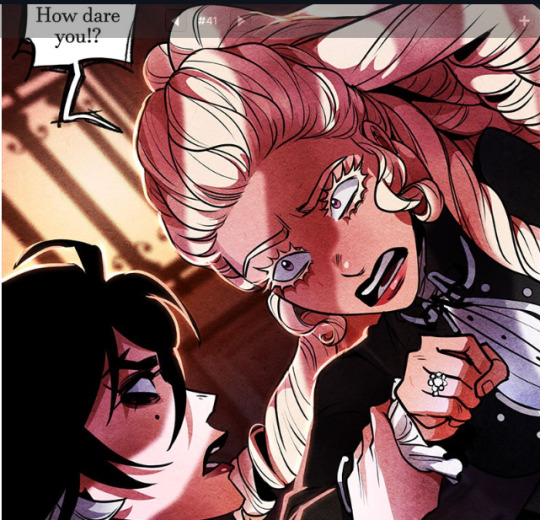
Or completely over-the-top reactions that we can't control.
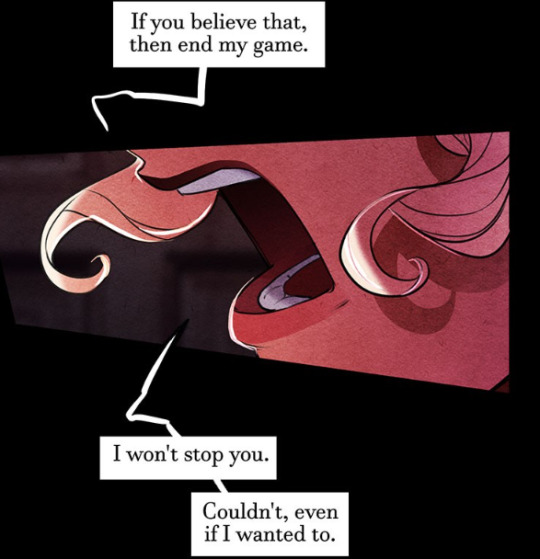
And it's not just anger that's affected, it's the whole emotional spectrum. Another emotion that is very noticeable is fear. If we don't develop tools to help us calm down, we don't get scared, we panic.
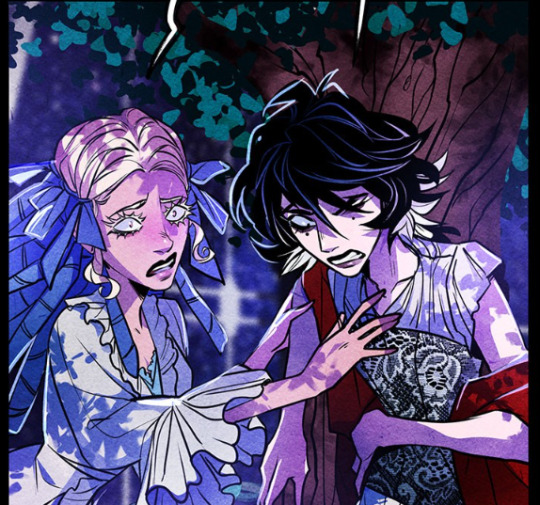
If this happens too often, we can become prone to developing severe anxiety or frequent attacks.

We may also have great difficulty dealing with frustration. Our brains love rewards, and feeling that we're not getting them because of our own inability to do something can be downright annoying. And if we don't have the tools to express our frustration appropriately, we can have quite childish reactions, ranging from temper tantrums to…pouting.
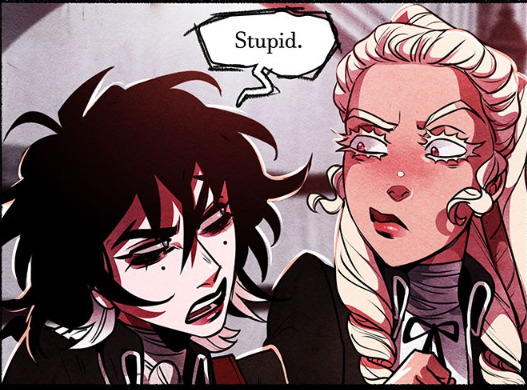
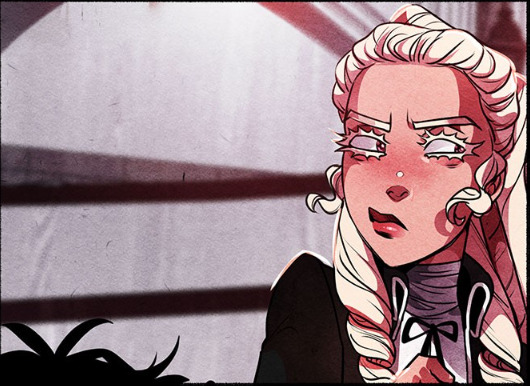
I find it funny how several of these pouts are caused by Lenore, a bit like "Oh, come on, honey, what are we talking about?"
Another important thing to note here is that one of the most fucked up and notorious symptoms of this lack of emotional regulation is RSD, short for Rejection Sensitive Dysphoria, defined as "a problem that interferes with your ability to regulate your emotional responses to feelings of failure and rejection. While rejection is almost always unpleasant, people with RSD experience overwhelming levels of emotional pain. This can lead to long-term mental health problems, fear of failure, and behavioral changes that negatively affect them throughout their lives."
Rejection and fear of failure are a problem for us. So much so that we may seek strategies to avoid it as much as possible, even when it causes us problems (such as not completing a task for fear of doing it wrong). This is an issue that can tear us apart emotionally.
Annabel is terrified of being rejected or despised. Her whole life has been built around appearances and getting the right people interested in her. If she can't do that, what good is she?
And that's something that comes up a lot in her relationship with Lenore. Repeatedly, in fact, but my favorite has to be this one:
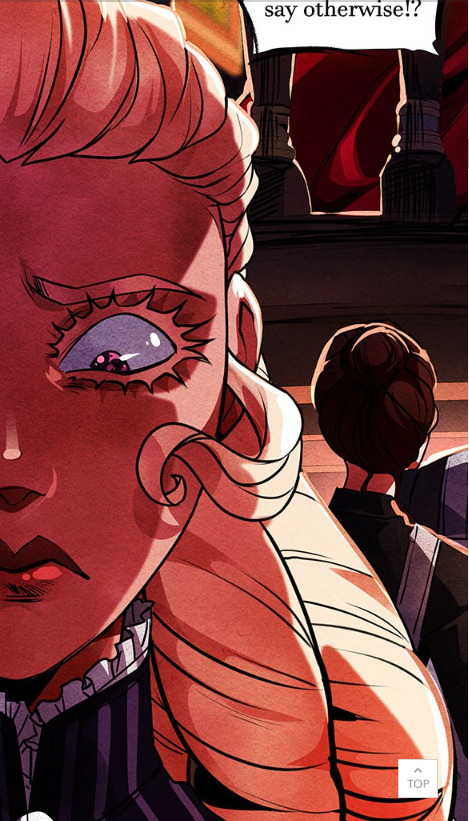
Annabel thought it would be the smart thing to do to break that bond because she knows they're never going to see each other again. But the look on her face when Lenore calls her a "damn liar" is just painful to watch. I think ripping her heart out with a rusty spoon would have hurt less.
Finally, on the subject of things that aren't so funny: that thing Annabel does about biting her fingers when she's in a critical situation is something I used to do, too (only I'd bite my knuckles or palms).

My psychologist explained to me that when you feel like you're losing control, you immediately look for something to ground you, and unfortunately, physical pain is often a quick (if damaging) way to do that.
Codependency
Okay, here's a thing: it's not that we have a tendency as such to codependency, but this is a situation that can occur due to bad practices within a relationship. Especially a couple one.
As it stands out, people with ADHD can have a lot of problems with micromanaging ourselves, remembering things, dealing with our emotions, etc, etc, etc. And it is natural for close friends, family or our partner to help in those processes.
The problem arises when that help starts to become a parentification process where the partner who is providing support starts to do this on behalf of the other person, infantilizing them in the process.
This is a cocktail for resentment on both sides: the party calling the shots can easily feel that the other is putting a huge burden on their shoulders and not trying hard enough, while, on the other side, no one likes to feel like they are being treated like a child. Let alone that the person doing it is your partner.
But at the other end of resentment, there's codependency.
The constant feeling that you are a burden, insufficient or even disposable.
And that means you have a lot to make up for. On a regular basis. So much that you put yourself in a situation where you have to make horrible decisions so that someone else doesn't have to because somehow you owe it to them, who hasn't had that happen?

What I mean is that yes, Annabel feels like she owes this to Lenore because she only remembers the part where Lenore came kicking in doors to save her from a marriage she didn't want. And if she can't do this for her, she doesn't deserve a relationship.
Feeling inadequate, that your partner is doing you some kind of favor by tolerating you and ending up idealizing their in the process is obviously not unique to the neurodivergent experience.
But we try, we try really hard and, like anyone else, we like to feel that the effort we put in is seen and valued.
If we are not careful about that, we do indeed fall into the risk of becoming codependent. The desire to feel loved or valued becomes a constant hunger for validation from which it is difficult to escape because we are aware that our brain will never function in a different way. And if that is mixed with RSD, it can become an even bigger problem.
Novelty, games, challenges, and rewards
Producing dopamine on a normal basis is one thing our brains aren't very good at (one of the reasons we can be prone to depression, for example), but you know what they love? Challenges and rewards.
New things feed our endless curiosity, but for some reason unknown to me, our brains really love challenges and dares. They give us dopamine like we're on a high.
So much so that some people use it as a tactic to perform tasks they don't like: "How many dishes can I wash before my dinner is ready?", "If I can finish this in less than 30 minutes, I can go get chocolate."

One medium we may like very much for this reason is games. Board games, card games, or virtual games. It doesn't matter. Games provide a very good balance of challenge and reward.
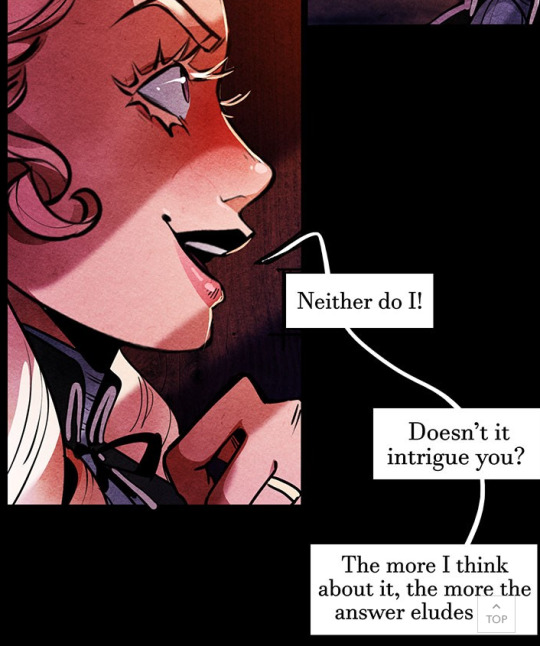
If you see that Annabel seems overly interested in how this works, it's because there may be a part of her that thinks "aside from the deadly situation we're in…this is like the most hardcore escape room ever" and inevitably there's something here that stirs her bug.
It may be something she loves about Lenore. As a good hypocrite, Annabel despises the rules she knows so well, so when Lenore comes along with this gimmick and completely changes the paradigm of what she knows, there is inevitably something that appeals to her. Others who are good at the game look down on Lenore's disdain for the rules, to Annabel it is fucking appealing because it offers a range of unexplored possibilities that she fucking loves.
Erratic Communication
When our brains are running at full speed, communication can become a challenge, and we tend to exhibit erratic patterns.
One of these is info-dumping. Touch a topic we know about or are interested in and it's like stepping on a landmine: we explode talking about it. Non-stop. You'll have to hit us to shut us up.

Another thing is that we can have a bad habit of interrupting. A lot. It's not malicious, it's just that we're really into the conversation and want to participate as much as possible.
That said, even if we're extroverts, it can be a nightmare to withhold information or participate in a conversation if it doesn't grab our attention. It's not that we want to be disrespectful or anything, it's just that, again, we have no control over our ability to pay attention and we're swimming against the tide to hold on to whatever it is you're telling us.
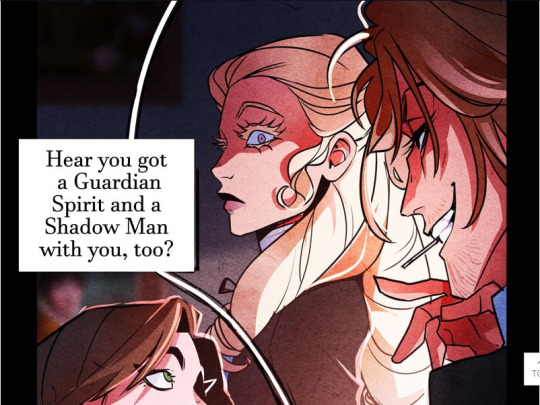
This scene is something I've seen in friends with ADHD and have been told I do: stare at people while doing your best to do the hamster run to remember what they're telling you because you know it's important, even though your brain is putting it together with junk information because it's not engaging your attention in the right way.
Ignore the murderous stare part, it's not that common - at least I hope not.
Drinks that are like a pill
Our brains are not designed to produce certain hormones naturally or, in some cases, they produce them under other circumstances. For things like that, we can take pills, develop strategies to help our brains produce hormones.
And drink coffee. Lots of coffee.
Caffeine can be extremely relaxing for us because it can actually help our brains keep functioning, you know that stereotype of the highly coded ADHD character who drinks coffee like it's his life? Well, that's because.

You know what other beverage has a similar effect? Tea. Theine is also a natural activator, perhaps less aggressive than coffee, but it can have a similar effect.
If you're interested in describing this topic in fanfic or touching on it in fanart, tea should have a relaxing effect on Annabel and even help her concentrate.
Boredom
We get bored. A lot. And we get painfully bored. Here's what happens: boredom is caused by a lack of stimulation, and our brains aren't stimulated just because we can't regulate our attention to seek out that stimulation.
Add to that the fact that when we are bored, without dopamine hitting our receptors, our executive functions diminish and we function like shit.

Boredom
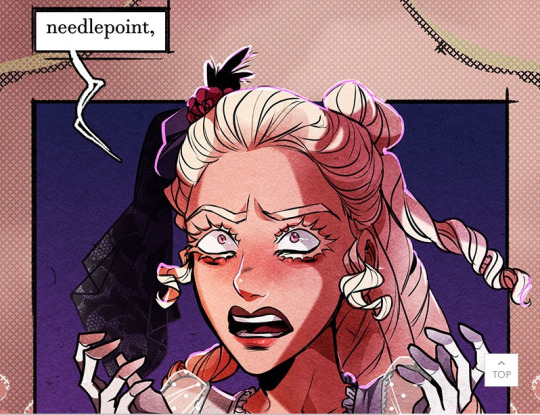
Is
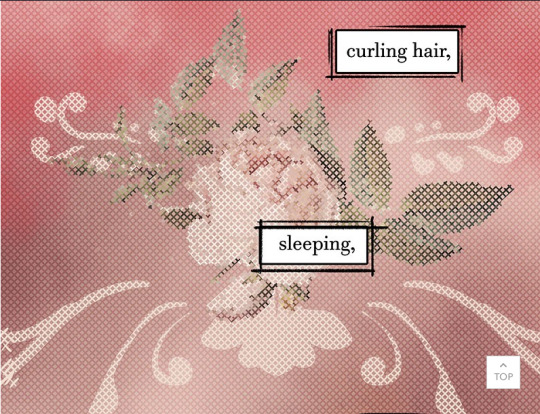
Fucking
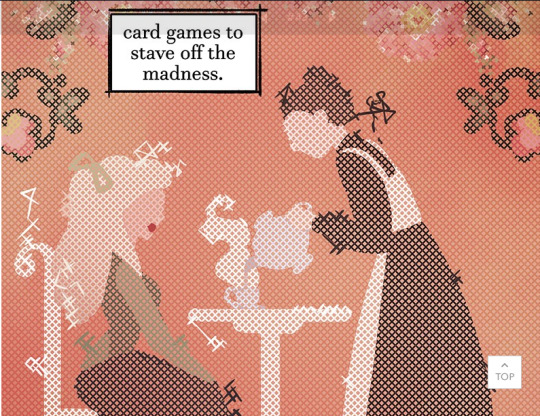
Murder
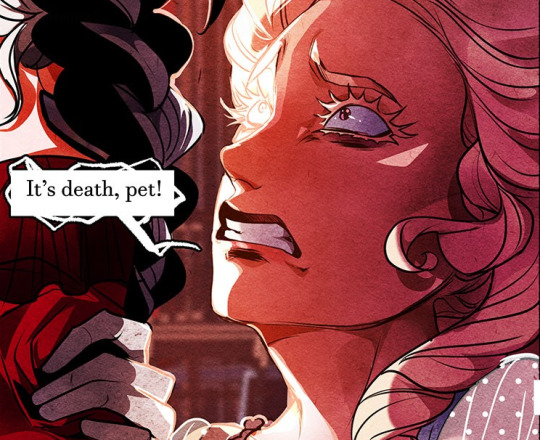
Because our brain starts desperately asking for dopamine and we can fall into really unhealthy behaviors like fighting, being chronically online, or eating because we can't find anything better to do. This also contributes -again- to our depression or anxiety.
Conclusions (and if I don't make the joke, I'll die)
In the book ADHD After Dark (a study of ADHD, relationships, and physical intimacy), Ari Tuckman draws some interesting conclusions, one of which is that on a statistical level, people with ADHD seem to be more likely to have what he calls "sexual eagerness": kinks, fetishes, a tendency to be adventurous in bed, and the like. Again, our brains love play, and both intimacy and flirtation can involve a lot of it.
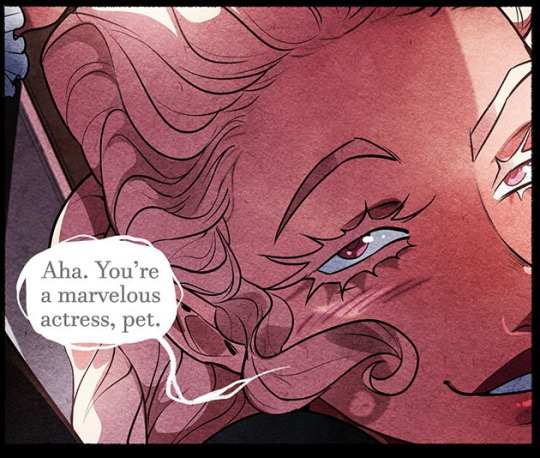
So…

Um…
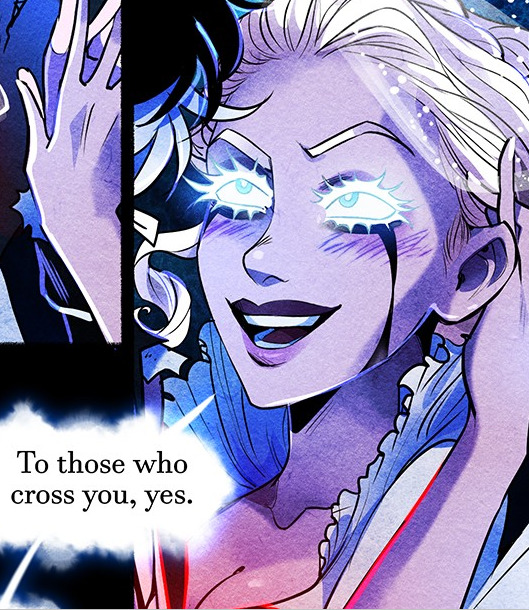
…well, I think Lenore will be happy. Good for her.
Anyway, this has been a seriously long explanation. Thanks for reading this far.
#nevermore webtoon#annabel lee nevermore#lenore nevermore#white raven#annabel lee whitlock#lenore vandernacht#annabel lee x lenore#lennabel#nevermore webcomic
234 notes
·
View notes
Text
Shigaraki's Psychological Conditions Headcanons - (a long ass post)

So, I'll preface this by saying I am NOT a psychiatrist and am not qualified to diagnose shit. I do however have a history of personal mental health disorders and am going to school for mental health work. This is mostly just for theory sake. My word is not absolute
Let's begin
warnings: mental illness as title suggests, not proofread and probably has typos
Antisocial Personality Disorder / Conduct Disorder
This one sort of goes without saying cuz duh he's a villain or whatever. I want to specify that in terms of Antisocial Personality, he likely is a sociopath, NOT a psychopath
I hear people call him a psychopath all the time and it's infuriating because people throw around labels without understanding what they mean. Psychopaths are more cunning and charming, and very manipulative. This isn't to say that Tomura is none of those things. Psychopath, however, applies to people like All For One. Almost diplomatic and very persuasive.
Tomura is a sociopath because he's known for recklessness and abrasive behavior. Psychopaths often pretend to have feelings, but for sociopaths aggression is a key emotion that's visibly displayed. They are also able to feel remorse in some cases, and I run this back to Shigaraki because he spent years in what was implied to be repressed guilt regarding the death of his family. Tomura admits it himself in his flashbacks, but ultimately decides to let go of that guilt (that he still fucking feels and is in DENIAL but that's another post). Hence, his forgiving nature toward his mother and sister when he's dreaming during surgery.
Even after Tomura let that burden go, he has no desire to be cool and collected, he just fucks around and finds out. Overall, though, he disregards people's lives and doesn't have remorse for what he's done because he throws his trauma and desires over it as a bandaid. He does show care and consideration to people in the League, though.
The conduct disorder part of it is self-explanatory. He's a violent criminal, lol.
Post Traumatic Stress Disorder (PTSD)
Duh.
Trauma is pretty much all Tomura has known. I won't reiterate his backstory, but being physically abused and rejected as a child, the murder of his family, being blatantly ignored by people on the streets, and AFO's upbringing? That's a lot
His PTSD is so dehibilitating that it took hold of his body language and behavior. Before the end of s5, Tomura was rigid and hunched over. In the MHA video games, he's also seen as very restless and moving his body around (until s4 era in One's Justice 2). I'll attach a video below.
He's also just very irritable and easily set off at the reminders of his trauma and rejection. "I HATE YOU" is a key example, as up to that point Tomura had been improving his rash behavior, but he's very unsettled by his past and continues to be now.
Obsessive Compulsive Disorder
His case of OCD is connected to his trauma and emotions. You'll find that a lot of his conditions feed into one another. For him, he has a variant of dermatillomania (often known as the skin picking disorder). For him, that is in the form of scratching rather than picking. But he does it compulsively and without thought, and he does it in attempts to self soothe. I believe he does it occasionally as a self injurious behavior, resulting in itching himself rather than lashing out. He even just does it when he's only moderately anxious or irritated.
Depression
While we don't see Shigaraki slumped in bed or feeling sad in the ways we see in many cases of depression, his "I hate everything" mentality puts him here. Actually, it's safe to say he experiences anhedonia, which is the lack of enjoyment in anything. He seems to somewhat enjoy video games, but his bio states "nothing" as his likes. I'm inclined to believe he feels no personal joy or happiness, and tries to attain that through murderous rage. Never works tho, does it Tomura?
Bipolar Disorder and Unspecified Psychotic Disorder
This one might stir some debates, but I do genuinely think he has a mood disorder. I don't want to feed into stigma that bipolar and psychotic people are "evil," because I myself have these conditions, so maybe I'm projecting lmao. He's definitely not medicated, and so I'd say his case is Bipolar Type 1. This type is characterized by intense manic symptoms, though depressive symptoms can be severe, too.
Tomura has manic tendencies, and he's impacted by mania in that he seems to get spontaneous motivation, but he also will stay stagnant for some time. I saw this as the case when Spinner literally went at Shiggy for putting the League in a complacent stage, but he's done this before, such as when he was in a slump about Stain. When his motivation surges, though, he goes above and beyond and doesn't put extensive thought into it. He just lunges into his desires in pursuit of satisfaction. He also has delusions of grandoisity to some degree and has a moment where he treats himself as invincible. He fought Gigantomachia for almost two months, and kept fucking going at him. Surely, he could've asked the doctor to call him off, but Tomura wanted that power so bad. Tomura also went into his surgery without asking many questions about it. He makes very impulsive decisions, even after people insist that he "matured." He also gets flicked into motivation like a snap of a finger, and proceeds to be lead mostly by endorphins and gratification.
When Tomura experiences what he perceives as a "positive" emotion, it overtakes him. He becomes pretty much engrossed in his bodily sensations. Through maniacal laughter and taunting language that's charged in a hate induced fuel. When Shigaraki has "voila" moments, he has a surge in neuroactivity and gets into aggressive mood stages, but I guess that could apply to most of the villains. I saw this when Deku told him the difference between him and Stain, and Tomura had a surge in manic-like bliss and drive.
I'm not sure if Tomura hearing the voices of his family before his epiphany was just intrusive thoughts, but I thought they may have been auditory hallucinations. Tomura admits to hearing things that aren't there and seeing visual hallucinations, too. Evidenced by:
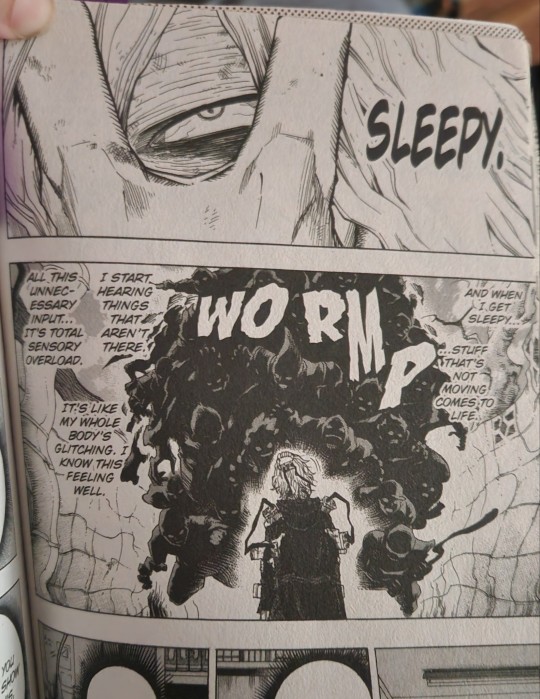
I hate how the dub translated this into "when you're this tired" as a broad statement. The manga gives this more personal association to Shigaraki, and he says that it happens when he's sleepy, and doesn't specify if it's only when he's extremely sleep deprived or just tired. Also, him staying up for days on end and smiling his ass off reeks of mania. He has delusional sprinkles in his thinking process, but they're not of bizarre nature, and are usually tied to his trauma. At this point in the manga he's very psychotic, though. That has a lot to do with him being fueled with adrenaline and also just breaking out of AFO's control.
I think he is either bipolar type 1 with psychotic features or has a mild case of schizoaffective disorder. Probably the first one, but I'm not sure.
ADHD (Attention Deficit Hyperactive Disorder)
This one is more of a gut feeling for me, but I see Tomura as being easily distracted and aloof to his surroundings at times. He's fidgety and does shit on whim.
Also, look at his room.
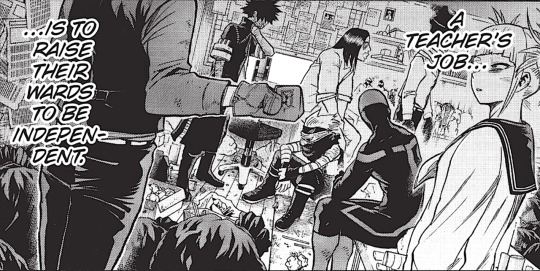
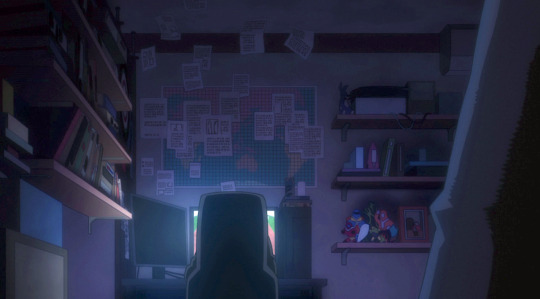
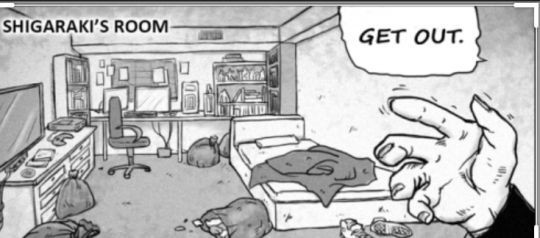
I'm not saying that everyone with ADHD has a messy room, but from what I can see, he goes from one task, drops it entirely without picking up, and goes to the next. Some could argue that Tomura simply doesn't care, and that's true, but he's at least got some decency to put the shit in trash bags. Trash bags that he HASN'T EVEN TAKEN OUT. I think he gets too caught up in the shit he's focused on that it slips his mind to do simple things like that.
He has spontaneous interests from what I can tell from the many books and toys he has that seem to have gone untouched for some time. He also hyperfixates, and I don't mean interest wise. I mean that when he's dwelling on something, it doesn't leave his mind for DAYS, until he gets some gratification. All Might in s1 and Stain s2 for example.
-
In conclusion, this boy has a grocery list of conditions, but I love Tomura. I love my beautiful prince with a disorder, and he is so dear to me.
I'm open to discussions about this, but please keep them respectful.
#shiggy#shigaraki tomura#shigaraki tomura headcanons#shigaraki headcanons#tomura shigaraki#shigaraki x reader#shimura tenko
193 notes
·
View notes
Text
If you've recently had to reconsider plans of seeking a diagnosis, or you worry that you may still need one even despite new concerns for your privacy and safety: consider what accommodations you'd hoped to gain from an official diagnosis, and determine if you can still obtain them without one.
Ask your doctor/psychiatrist/therapist to write notes or letters for you attesting that you need specific accommodations for particular behaviors/symptoms without mentioning whatever condition those behaviors/symptoms stem from (or that you believe they stem from).
They can do this for you without you having any official diagnosis. Get your executive dysfunction/anxiety/overstimulation/etc. accommodated at work or at school without needing the full diagnostic code.
(Individual diagnosis for particular behaviors/symptoms without a full diagnosis linking them back to any specific condition may also be possible but I don't know enough right now to say if it's recommendable.)
Also remember that it's illegal for a lot of places to ask you for health/medical documentation. Know your rights. Don't disclose any medical info that you legally don't have to disclose. Give nothing away; even if it is legal for them to ask, you may not legally need to provide an answer.
Find out what information your insurance, pharmacy, etc. have been sharing about you; HIPPA allows disclosure between providers and insurers without your knowledge or permission. Find out if that information has been going anywhere else.
Know yourself; if you tend to overshare or say too much about yourself, be careful who you speak to.
Peer-review and self-diagnosis are valid; especially if an official diagnosis is likely to do more harm than good, by causing you to be denied citizenship in certain countries, or forbidding you from fostering or adopting, or enabling hidden workplace discrimination (up to and including reduced pay, rejected job applications, and terminated employment), or disqualifying you from insurance plans, or allowing toxic carers in an unsafe home environment (or anyone else you may be legally/financially dependant on) to effectively use your condition against you in a bid for control over your autonomy.
Be aware of your medical needs, go to checkups and get what you need to maintain your health, don't cut off your own access to professionals; but know the benefits and know the risks involved. Know the cost of access to gatekept resources. Be aware of who and what will be able to see your private info. Protect your privacy and autonomy. If the risk isn't worth it, then know what you can manage yourself, and know who you can rely on for the rest. Regardless, do what it takes to survive and get yourself the safety you need. Research how to best support yourself without a diagnosis or without access to a professional.
Self-advocate for the services you need. Demand the support that will empower you.
Don't be a martyr. Watching out for yourself and your loved ones and your community is more important than making a statement.
Know your support network. Reach out to community. Connect with other people in your position and share what you know.
If this isn't you but rather someone in your family or friend-group or community: help them build/maintain a support network that will assist with practical accommodation. Push schools/workplaces to give accomodations without need of a diagnosis from the one being accommodated. Be an ally. Protect your diagnosed family, friends, and neighbors. Protect your undiagnosed family, friends, and neighbors. Advocate for institutionalized people. Advocate for and listen to and protect those with higher support needs.
Not everyone will be able to do this. Protect the ones who can't.
#autism#asd#actually autistic#audhd#autism community#neurodivergent#real life#important#current events#info taken from various notes on mysterioussinkhole's post and several reddit threads#some of these points are paraphrased tags from other rebloggers you can find them in there if you want#I wanted to compile various scattered points
20 notes
·
View notes
Text
I wasn't going to post about this because it felt too vulnerable, but I think that might be what I need right now. 8 years ago today I attempted suicide and came the closest I've ever come to succeeding. These are my reflections on 8 years.
On September 27th, 2016, I took a month and a half of lithium and came the closest I’ve ever been to succeeding at killing myself. At the time, I saw it as just another failure to add to my ever-increasing list of them. Now, I don’t know what I think, but I’ve learned things since that have not brought me peace.
At the time, I had been suicidal for weeks, and I had a detailed plan for how I’d finally do it. I struggled through shift after shift at my shitty, dead-end retail job where I faked a smile, wondering if anyone could tell that beneath the exterior, all I wanted was to die. But we need to take it back further than that for anyone to really understand. This is the most vulnerable I will ever let myself be.
I am a psychiatric survivor, and I am also a victim of severe abuse, primarily sexual. I choose to think of myself as a victim rather than a survivor because since the age of 14 I’ve felt like a shell of a person in ways I don’t feel regarding my medical trauma. My internal scarring is so severe my ob/gyn says I will likely never have children, and I have damage to my parietal lobe from having multiple concussions in the same area of the brain. When I finally disclosed to a psychiatrist what I had been through, she told me it was one of the most severe cases of abuse she’d ever seen. That is all I will disclose of my experiences until my abuser has left this earth.
I have been diagnosed with everything you can think of at one point or another. My medical records practically recite the DSM-V. Right now, my diagnoses are bipolar-type schizoaffective disorder, borderline personality disorder, and obsessive-compulsive disorder, but I don’t care what label you want to put on it, because at the end of day, I am a product of my experiences.
I grew up as the oldest of three (now four, as I have a baby half-brother now). Growing up, I didn’t understand how my two younger sisters could handle their emotions, but I couldn’t. Every single thing I felt, felt like it would drown me. I experience all my emotions as physical sensations that I can feel throughout my entire body, and it manifests as literal chronic pain. My entire childhood, it was “stop crying”, “nobody else is upset about this”, “I don’t understand what the problem is”, but that’s the theory behind borderline, isn’t it? Borderline personality disorder is what happens when you take a sensitive child with big emotions and consistently invalidate them over and over again. As such, they never learn how to deal with their strong emotions and they turn inwards on themselves. That is exactly what happened to me.
My emotions cause me literal pain. It hurts every day. When my BPD gets triggered, it feels like my veins are on fire beneath my skin, like someone is trying to claw their way under my ribs, like there’s something inside of me that feels so horrible I just want to die. I am a lifetime self harmer, because it’s the only way I am able to bring myself down in those moments - to take the emotional pain inside of me and make it physical the only way I can. I’ve accepted by now that I will never stop.
The first time I had an intrusive thought about suicide, I remember being 11 years old. It has not stopped since. That’s where the suicide-type OCD comes in - I live every day with graphic intrusive thoughts about all the ways I should kill myself. This happens even on the best days of my life, it’s there, waiting to taunt me, to tell me that I should just die and here’s how I should do it. I have thought about suicide every single day for almost 20 years. The first time I made a plan was at 11, and my first attempt was at 14. I am chronically suicidal.
The first time I died was in 2016. That September, I was so overwhelmed with all the things that had happened to me and everything I’ve spent almost my entire life having to live with that I made a plan. I thought I would never get better. On September 26th, I went to the psychiatric emergency department at St Joseph’s in Hamilton and told them I had a plan to kill myself, and that if they sent me home, I would act on it. They did not take me seriously, because why would anyone trust another manipulative, hysterical borderline? Dr. Janet Alice Patterson, who I still partially blame, told me to make an appointment with a psychiatrist, gave me a very strong dose of a sedative, and sent me home.
When I got home, I took all the lithium I had and called 911 so that the paramedics would find my body instead of my family. I spent four days hooked up to machines, and as far as I’m aware my heart actually did stop briefly, but it’s not like I can remember most of those four days I spent in the ICU. What I do remember was waking up not knowing where I was, not even being sure if I was alive or if this was hell, because there’s no way I’d be going to the other place. Around me was a doctor and a gaggle of residents who weren’t much older than me, all looking at me like I was an animal. The doctor asked me a few questions to determine whether I was still at risk to myself, and then she turned around and talked to the residents about my medical history as if I wasn’t even in the room. I could hardly respond after having a tube down my throat. This was the lowest moment of my life, and I was a case study to them.
After that I did trauma therapy, three rounds of DBT, and CPT. I tried medication after medication, and I improved my situation. I went on to get a degree in social work and finished with a 90% average. My former diagnosis of PTSD was rescinded. I was considered “recovered”. Do you know what I learned from all of that?
I learned that no, actually, it doesn’t get better. I thought if I did all the right things my chronic emotional pain would go away, the daily (sometimes hourly, sometimes half-hourly) intrusive thoughts about killing myself would stop. I thought if I did what all the doctors told me, I’d “get better”. And I did. But I don’t like what “better” ended up looking like.
Sure, my situation improved. In fact, I pretty much have my dream life, in some ways. I have a fulfilling career and my dream job, I have a wife who loves me, I have a cat who sleeps at the foot of my bed, I have a fancy piece of paper I can put on my wall to show I graduated from college with distinction. I should be happy, but I’m not. It still hurts every day. My emotions still overwhelm me to the point of physical pain, and I still think about suicide multiple times a day. You just learn to live with it.
And that’s the worst part. Expecting all of it to go away if you do what the doctors tell you to and you make all the right choices on your own, only to realize that when you’re royally fucked, this is just what life is going to be like. And you have to keep choosing life over and over again. You have to find reasons to keep going, even when it hurts so much you think the chronic emotional pain will kill you before you can do it with your own hands.
I’ve only ever met one person who’s understood what this is like. The only other person I’ve met who also had suicide-type OCD and BPD was my roommate when I was moved up to psychiatry in the hospital that day. Me and O fell in love very quickly, and we spent the next two years in a whirlwind of whatever you could even call our relationship until the day she killed herself. The only other person who knew what this was like - for your emotions to swallow you whole and be chronically suicidal every day of your goddamn life - and she killed herself because it hurt too much. From the day she died in 2018, I have never felt more alone.
I have been considered “in remission” since 2019. I’m one of the ones who “got better”. I don’t feel “better”, because it doesn’t get better. Your situation improves, sure, but you spend your whole life fighting that thing in your head that says you don’t deserve to be here anymore. And that’s what they don’t tell you. All the stories about recovery make it sound like it’s some hurdle you overcome. No, that hurdle never goes away. You keep fighting it until you can’t anymore.
I wish my reflection on eight years could be more positive than this, but here we are. It doesn’t get better. Sorry to be the one to say it.
#don't read this if you're in a bad place#i didn't struggle with this anniversary this much last year but. here we are.
11 notes
·
View notes
Text
How a Psychiatrist in Gurgaon Can Help You Build Emotional Strength and Resilience

Emotional strength and resilience are crucial in today's fast-paced world to maintain good mental health. The pressures of work, problems in relationships, and other unforeseen hardships take a toll on mental health. Professional help from a psychiatrist in Gurgaon can be a transformative step toward building emotional resilience and coping with adversity effectively. Understanding Emotional Resilience Emotional resilience is defined as the capacity of an individual to deal with the uncertainty, shock, or setbacks in life without going through stages of emotional collapse or reduced well-being. People with high emotional resilience are able to withstand the storms of life while maintaining their composure about what's happening. This does not come naturally to most people and needs guidance, practice, and sometimes professional intervention. Role of Psychiatrist Gurgaon in Developing Emotional Strength He does this by ascertaining possible mental health-related issues and customizing strategies tailored to improvement through a psychiatrist in Gurgaon. Here's how they might help: 1. Psychotherapy and Counseling Psychiatrists provide evidence-based treatments such as CBT, DBT, and mindfulness, which have proven that if people are able to recognize the negativity in thinking patterns, they can develop different coping mechanisms. Thus, these therapies will enable the patient to reshape his or her mindset and emotionally develop a well-based connection. 2. Addressing the Root Problem Unresolved trauma, anxiety, or depression usually results in emotional distress. A psychiatrist in Gurgaon can diagnose these conditions and create a customized treatment plan to ensure that the root causes of emotional struggles are effectively managed. 3. Coping Strategies Resilience is not about avoiding difficulties but rather learning how to respond to them effectively. Psychiatrists help in the development of individualized coping mechanisms, along with stress management techniques, breathing exercises, and relaxation methods, which will allow a person to meet any situation with confidence. 4. Medication management (if needed) Certain treatment may include using medication, aiming to achieve balancing chemistry within the brain that guarantees emotional stability. A psychiatrist does case study; hence medication shall only be applied when the circumstances call��for its use. A holistic care strategy is then undertaken. 5. Encouragement of Lifestyle Enhancements Emotional resilience is very closely linked to physical health. A psychiatrist in Gurgaon may recommend lifestyle modifications such as exercise, diet, and sleep for better mental health. 6. Self-Awareness and Emotional Intelligence Understanding how one feels and reacts is a vital component of building resilience. Psychiatrists help the individual develop self-awareness and emotional intelligence, so that they can identify triggers and respond thoughtfully rather than impulsively. Practical Action to Enhance Emotional Resilience In addition to professional psychiatric treatment, there are several practical actions that the individual can undertake to enhance his/her emotional resilience: Support network: Relationship with family, friends, and counseling group. Mindfulness/Relaxation techniques: Meditation, deep breathing, etc. Exercise regularly: Exercise is a natural mood elevator. Work-Life Balance: Maintain a healthy balance between work and life and avoid Burnout. Positive Mindset: Cultivate a mindset of gratitude, optimism, and self-compassion. Benefits of Emotional Resilience Emotional resilience, led by a psychiatrist in Gurgaon, brings with it several benefits such as: Improved management of stress Improved problem-solving skills Strengthened relationships Boosted self-confidence Decreased anxiety and depression
Conclusion It is indeed possible to develop the ability to have emotional strength through appropriate guidance and support. In fact, talking to a psychiatrist in Gurgaon at Tulasi Healthcare can just be the ticket that can equip you with tools and strategies for developing the much-needed emotional strength in life. So if you feel like you are undergoing emotional distress, the first step to a healthy and resilient lifestyle might just lie in professional help.
#best psychiatrist in gurgaon#rehabilitation centre in india#rehabilitation centre#best psychiatrist in delhi
0 notes
Text
I get to overanalyze Marsha Thankk You for the Dialectics, But I Need You to Leave
Starting off, it overall is a song written in three different perspectives. That of an older figure who doesn’t believe in certain mental health conditions, a younger person who’s mental health is deteriorating, and lastly a mental health care professional, who seems to not take their patient too seriously. For now I will call them the Guardian, the Patient, and the Doctor.
The Guardian
The Guardian’s perspective is the most prolific, their voice and perspective being heard the most. When seeing the younger person who doesn’t know how to take care of themself as they once were able to, the Guardian simply tells them that they’re only sick because they want to be, with lines like “They could prescribe you any illness you'd like if you define the terms of your ailments.” That is the very opening of the song. When they don’t see their (seemingly child) getting better, they scold them, stating their own ideals with what seems to be malice, saying “Cause back in my day we didn't need no feel-good pills and no psychiatrists. No, we just drank ourselves to death, and god damn it, we liked it.” In a way, saying they’d rather in a way drown out their troubles via killing themself than suffer. At the end of every chorus, it’s the voice of the Guardian listing something that is implied they witnessed, or even went through. They listed bleeding out in their bathtub, lobotomies, shock therapy and “mad scientists” before saying that they’re just wasting their breath even mentioning the topic. This is made to mimic the perspective of those looking into the song from an outside perspective. When looking in, Marsha is seen as unhinged, it’s odd, it’s self-pitying, and it’s a cry for help, or a cry for attention to some. Somebody who aligns with the Guardian's perspective is probably likely to see something unnerving and ignore it, or suppress their feelings. It's easier to ignore what's happening than to acknowledge the uncomfortable, and the Guardian's perspective in Marsha highlights that.
The Patient
The Patient is a person who’s mental state is deteriorating to the point that they are losing their sense of self, because all they know is what they’re going through. When they cry for help, they are still not as heard as their doctor, or the figure telling them it’s all in their head. These two figures have more lines in the song than the person suffering in the first place. “Disease is in the eye of the beholder.” They say to their doctor, trying to convince the Doctor and themself that it’s possible to recover. They want to get better, but they have no faith in their recovery. The Patient is willing to change anything about themself to try and get better somehow, when all they know is their diagnosis, ridicule and trips to their doctor. “If our harmonies don't sync, we can change our voices. A chorus on condition of our diagnosis.” This perspective is one of the fans. There is some talk online about how WW’s songs tend to relate with the mentally ill, WW himself being open about his experience with being diagnosed with Bipolar personality disorder. It's one begging to be heard, and begging to know what it takes to be considered normal, to be healthy. Somebody who aligns with the Patient may look into the song and feel seen. They'll try to conform while trying to be recognized. To those who see themself in the Patient, Marsha may feel a bit sad, or they may feel better with being recognized.
The Doctor
With the second most lyrics, all they do is ridicule the patient, asking a few questions that tend to be asked in therapy, but warped in a way, saying “you-dentity” instead of identity. The Doctor is also heard saying the Patient is just a character, rather than a person. “You're not your thoughts, you're not your brain. You're just the character you've made.” The Doctor speaks coldly, and doesn’t diagnose the Patient. They look at the actions of the Patient, saying they(the Patient) would rather prefer to “flip through old issues of People” over getting better, completely disregarding everything the Patient cried out for help with. And after this, the Doctor just brushes them off with, “Well that’s our time, see you next week.” and with that, the song ends. The Doctor mimics the perspective of the analysts. They read into the wrong things, and try to understand every little detail of the words spoken, rather than the deeper meaning, and the true issue underneath. When only looking at the surface, you miss everything that happens beneath it. People who align with the Doctor need to stop trying to find deeper meanings, and Marsha may just look like another puzzle to answer.
But also WW has said all songs are up to interpretation, so maybe I’m just crazy.
0 notes
Text
in a weird mood, here’s a kinda lengthy vent about medication and my bf
I’m kind of annoyed that my bf is so adamant about me staying on antipsychotic meds, despite me not experiencing psychosis in a long time. He insists that the reason I haven’t had psychosis recently is because of the meds, and therefore I should stay on them long term
and perhaps he’s right, maybe the reason I’ve been stable is because of my meds. But what doesn’t get through his head is that antipsychotics can have detrimental side effects. metabolic problems, weight gain, muscle stiffness, tardive dyskinesia, “zombification,” trouble speaking, etc.
Fortunately the medication I’m on doesn’t have any immediate side effects, at least none that I notice. It’s also the least likely antipsychotic to cause metabolic issues or weight gain. Yet I don’t quite feel like myself while taking it. I suspect that the reason I developed prediabetes is because of my medication, although my psychiatrist tells me that’s unlikely. I just think it’s strange that I was perfectly healthy (physically) up until I started taking these meds.
I have already made it very clear to my psychiatrist, and my therapist, that I don’t want to be on antipsychotics for the long term. I just wanted them to stabilize me after a psychotic episode, and then once I was back to my “normal” self, I would stop them. But my boyfriend does not agree. He thinks I should stay on them, for the rest of my life, if need be. His logic is that the meds are clearly working, as I haven’t had a psychotic episode since taking them. and since I’m diagnosed with schizoaffective disorder I’m prone to psychosis and delusions, hallucinations, etc. The meds are supposed to help prevent those symptoms, and it seems they’re doing it’s job.
But despite all that, I just don’t feel comfortable taking this medication anymore. I think it’s unnecessary, I think it’s negatively affecting my health, and i think i have enough insight into my illness to be able to handle psychosis in the future. I think the meds have outlived their usefulness in my life and I’m ready to get off of them. But my bf heavily disagrees with me and sternly tells me to stay on the meds. He says it’s for the betterment of my health, that it’s to keep me stable.
I guess I’m just kinda pissed at him because I’ve had this conversation with him four times already, one of them being a fucking two hour conversation, and regardless of all my reasonings he insists that I should stay on my antipsychotics. And he has the nerve to tell me he doesn’t want to have this conversation anymore. Like he’s completely shutting down my valid concerns about my health and what goes in my body, and won’t give me the freedom to choose to be unmedicated as a schizophrenic person. It makes me feel disrespected, disregarded, and even a bit controlled.
He tells me it comes from a place of love and concern for my health. He thinks the side effects are just a price to pay to keep myself mentally stable. He doesn’t want me to end up in a psych ward again, etc. And I 100% get that. But what he isn’t getting is that ultimately, it’s MY choice whether or not to be medicated. It’s my body, I choose what goes in it. Even doctors and psych wards can’t force you to take meds if you don’t want to. What makes him think he should have any say in what medications I take?
And the most absurd part is, I’m completely willing to go back on antipsychotics if I end up slipping into psychosis again. If I have another episode, if my symptoms resurface, I will go back on my meds and stay on them for as long as I need to. But he won’t even give me a chance to stop my meds to see if I can manage without them, or see if my health improves. He apparently doesn’t want to risk me relapsing again. He would rather I stay on these potentially damaging pharmaceuticals than me go into psychosis again. To me it feels like he doesn’t trust me. He doesn’t think I’ll be able to handle my illness without the meds.
he even went as far as to compare me to his immunocompromised sister with cancer. “Well she takes her meds because she needs them to be healthy, therefore you should take your meds because you need them to be healthy.” As if a deadly illness like cancer is even remotely comparable to a mild case of schizophrenia.
Idk man. I’m just mad. I want off these meds. I’m done with them. Shouldn’t the simple fact that I don’t want to take them anymore be reason enough for me to stop? Why is this something that’s up for debate? Why does it have to be a whole fucking argument that only he can win? Why can’t I just stop the meds for the sake of stopping the meds? Why does it have to serve some greater purpose? More importantly why does he feel like he should have any say in MY medical treatment and what goes in MY body?
I love him and I understand his concerns but he seriously needs to stop being stubborn, quit this weird superiority complex, stop infantilizing me and let me decide how to handle my own mental health.
0 notes
Note
hi, thanks for answering, i appreciate it. also that you didn’t just call me toxic or some shit and tell me to fuck off. i’ve actually never thought of joining a discord server but it’s a good idea, thank you, i think i could try that. i guess on another account though to prevent anyone from accidentally finding out bc you know for yourself how it is. i’ll look up if i can find some kind of dbt workbooks online as well.
the journaling idea is good as well, i’ve actually been trying for a while but i end up rarely using it as a past experience left me with kinda bad trust issues about writing / drawing things down where someone could see them. but i guess i could try hiding it better this time or something. it’s just this thing that also sometimes venting like that actually ends up making me even more frustrated, as i realize i’ve already written about this exact thing countless times before yet still nothing has changed.
i’m trying not to make a too harsh judgement of my therapist yet, considering i haven’t been seeing her for that long, but… yeah. when i said that i’ve been going to therapy for years i meant going to a lot of different ones in this time. no one ever gets me. their advice is always so fucking useless. honestly at least this current one actually listens and doesnt make me feel uncomfortable or like i’m being judged. i think she’s the one i’ve been the most honest with because of that (and also because i just started telling her everything from the first session on already bc i’m tired of everyone always turning out to be nothing but a waste of time and money and effort), i generally lie to therapists esp my psychiatrist so i can get the meds i want (or else im 100% she’d just put me on some shit like antipsychotics, which ive been on in the past and i’d honestly rather kill myself than take them again, idk if you’ve tried them before but i basically felt r*tarded [idk how some ppl are sensitive of slur use like i personally dont care but i dont want your blog banned or smth] and tired all the time and it “”””helped”””” in the way that it made me too slow to be able to think about my problems. thanks psychiatry. not a traumatizing experience at all). i mentioned that i suspect i could have a personality disorder to her once or twice and she seemed to agree that it could be a possibility, but obviously no one can diagnose that fast. but i guess i’ll see. i really just want to know whats wrong with me, why do i think the way i do, why i can’t just be more fucking normal no matter how hard i try. but getting an actual diagnosis of a PD esp if it turned out to be this one would just mean i’d get treated even worse by every single doctor, not even necessarily a mental health one, bc physical doctors see all your records as well,, i’ve already been told my legitimate physical issues are just bc im depressed, or even if they dont straight up tell me they definitely treat me less seriously and i just know its bc i have mental illnesses diagnoses & im female.
i just … ugh. i feel so sick of it all and misunderstood. i know i can get genuinely abusive in arguments when someone upsets me but i really dont know how to stop or control myself. i hate that people act as if it’s all my fault. like everything i’ve gone through doesn’t even matter and i’m just an inherently evil person. like i didn’t have some kind of a terribly traumatic childhood, but i’ve always been either bullied or excluded by almost everyone i’ve ever met and all the social isolation honestly really fucked me up. i think that’s why i developed such a strong individuality complex as i’ve never been able to think all of it must be simply because i’m worthless. like fuck no, 99% of the people are dumb and shallow and ignorant towards reality of the world and i’m supposed to feel like i’m somehow worse than them? at least i have self awareness and my own thoughts. i mean i do think we’re all worthless because nothing in life has any value, so why should humanity be the exception? that still doesn’t stop me from hating everyone though. i may be a hypocrite but so is everyone else; and at least i don’t pretend to be a gOoD pErSoN. lacking empathy and not having morals doesn’t make me any less deserving of help even though i know how many people unironically believe people like me should just be shot. fucking brainless hypocrites, all of them.
but anyway yeah my point here is, fuck people who think anyone chooses to be this way. all of this has done nothing good for me other than made my life much harder. and not to mention unable to ever get genuinely close to anyone because what is the worth in a relationship if i can’t even bring myself to care about anyone? i don’t think “empaths” even realize how alienating it actually is. which is once again so ironic because THEY should be the ones to try to understand it, but no, they just generalize everyone and share the nonsense propaganda that we’re incapable of change.
so yeah, this turned into another vent but i really lack any people in my life who i could be honest with. i feel so lonely all the time. it’s not even really missing a friend group or romance or physical touch, it’s more of this feeling of feeling completely alone and that no one (other than a few people whose writings and actions i admire but they’re all dead) would ever be able to truly understand me. so yeah as cheesy as it is, sometimes it’s nice to be reminded i’m not alone by someone other than a generic social media post made by someone who’d 100% hate me if i told them even half this shit. can i maybe dm you sometime btw? i felt like staying anon while writing this bc i tend to get anxious with ppl at first but idk, maybe, if youre comfortable with that ofc
btw if its alright to ask can i ask how did you get diagnosed? what was the process like and how long did it take? did they suspect anything else at first? do you feel treated by ppl any differently now tjat you have a diagnosis of such a stigmatized disorder? (^ i mean these previous questions if youre diagnosed by a psych, if not its perfectly valid as well ofc) whats personally helping u to cope?
Good luck! I’m glad I could offer some help/reassurance. Maybe instead of a physical journal you could use a private blog or even just a notes app on your phone/computer if that sounds safer?
I do hope things improve with your new therapist and that things work out, it’s good that she at least agrees you might have a PD. Normally I’d recommend a therapist who specializes in PDs, maybe even especially NPD, but idk if that’s accessible for you and/or if you’ve already tried it and had no luck.
But again, I want to reiterate that you’re not alone, and what you’re going through and what you feel is 100% relatable to other pwNPD. I truly wish that more people understood us and the irony isn’t lost on me that it’s always “empaths” who are the ones who have the LEAST empathy for us. And I feel like the societal lack of understanding contributes to the more “ugly” or “stigmatized” traits of our disorder even more, tbh. Anyway, my point is that I definitely don’t mind at all if you vent, so please do feel free to DM me if you want to or feel more comfortable that way!
As for my diagnosis, it’s a bit messy — for context im a recent graduate from college and the bulk of my therapy came from campus services, where it was acknowledged I very likely had a PD especially within cluster B but I never got an official diagnosis while I was seeing the school-based therapist, and at the moment I’m trying to find a new therapist who can help me. At first we thought I just had a really intense form of rejection sensitivity dysphoria due to ADHD, then realized it was likely something else. So I’m a weird mix of “self diagnosed, but likely wouldn’t have admitted it to myself or realized it if a professional hadn’t pointed me in that direction.” Until I can find a professional im honestly just doing the best I can to help myself. Sometimes I get tempted to turn to substances to cope bc they make me softer and more open, and if you feel the same way I highly recommend avoiding this, ofc. I mostly use relatable music (lmk if you want my NPD playlist!) and DBT workbooks as a way to help myself, and I also just try my hardest to avoid or remove myself from situations where I might lose my cool and become toxic. Obviously this is easier said than done, but there are ways to do it. For instance, if I’m in a group chat where I feel like people are getting more attention than me, I’ll mute the group chat and maybe text someone from a different group one-on-one (not necessarily about my issues, just in general).I know that answer is pretty mild and entirely social media based lol, but it’s the best example I can provide.
3 notes
·
View notes
Note
I honestly think BPD is just new wave hysteria label for women; the overwhelming amount of women diagnosed with BPD that have been sexually abused.. many even by their fathers too. BPD is such a stigmatizing diagnosis for the very reason (that nasty anon is who I am referring to;) BPD diagnosis are a way to label patients, (most commonly female patients receive the diagnosis,) as a way to label them "too difficult to treat." Theres a youtube video by Daniel Mackler that I really like; "Critique of borderline personality disorder by a former psychotherapist" . He talks about the abusive mistreatment patients receive from therapists for that label, the types of patients who are labeled BPD, and what he feels the origins are. And honestly hardcore agree. I have had people (online, thankfully never by a therapist... my therapist says I have complex trauma and would never give me such a stigmatizing label and knows how I feel about the disorder system,) suggest I have bpd. I was very offended, then they explained how it wasn't meant as an insult, but a lot of trauma symptoms mirror bpd, I looked it up, and honestly still find it insulting. Sexual abuse, repeated boundary violations; what I have experienced would make anyone "bpd", so many women have endured constant boundary violations that would make anyone borderline. Saying Heard is borderline is a way to invalidate that she is traumatized and a covert way to invalidate her because yup; that is how folks labeled with bpd are seen; crazy, manipulative, and abusive even.
the youtube video I mentioned, he notes that when he gave people a ptsd diagnosis, a less stigmatizing diagnosis, patients were treated much kinder by psychiatrists.
BPD symptoms are real, but I think bpd is a misogynistic label, used to gaslight, shame, and blame women with trauma and paint them as crazy.
Also, fuck that anon! Heard is victim of male violence, she is not crazy, manipulative, or abusive. That anon is projecting how they view women.
Theres a lot of misogyny in the mental health field.
Sidenote: how are y'all bypassing the character limit on asks? 👀 I thought maybe they got rid of it but I still was on a limit when messaging another blog.
I agree with you. Anytime a diagnosis is overwhelmingly more common in women than men or vice versa, I think it's very important to look at why it's being diagnosed so predominantly in that population. I have heard some people theorize that BPD is more common in women because men with the same symptoms are more likely to be diagnosed with NPD or AsPD, but I feel those are very distinct categories even if they are all in Cluster B. BPD is imo largely based on a fear of trusting -- trusting yourself, trusting others to be kind and safe and present, etc. And that fear isn't commonly seen in NPD or AsPD afaik.
I'm very much in favor of BPD being shifted from a personality disorder to some sort of trauma-related disorder. If we framed it as, for example, a subtype of PTSD or a similar-but-distinct disorder (like PTSD vs CPTSD -- which isn't in the DSM, but is in the ICD), I think providers would be much more understanding of where those symptoms come from, and it would help reiterate that this is a reaction to trauma rather than a "disordered personality." And then people with that set of symptoms could actually get support instead of judgment.
Because yeah. BPD symptoms overwhelmingly make sense when viewed within a lens of trauma. Of course they're going to be afraid of trusting people when they were betrayed at an early age by the people they should have most been able to trust. Having a hard time knowing who you are after trauma is common. Feeling like you can't survive without a safe and trusted person (fear of abandonment) makes sense after abuse, trauma bonding, having self-esteem torn down, gaslighting, etc. And so on.
Thank you for the video rec, I'll check it out when I have a chance. I've been looking for a source I can point people to. I learned a lot from a particular book, but I later found out some people have come forward and said their personal stories had been included in this author's books in an identifying way without their permission, so I don't feel comfortable recommending that author and have been wanting to find other sources for the claims from the book.
The mental health field has a lot of issues (including but not limited to misogyny) tbh. To be sure it’s done some good, but I think we societally need more nuanced conversations around the ways it needs to improve.
One good (I guess, but Amber shouldn’t have had to suffer for it) thing about this trial is at least it’s got more people recognizing the reality that misogyny is still very much present in our society. I feel like there’s been a pushback against that in recent years. I remember being younger and saying I was a feminist, but struggling to actually name ways that I saw or had experienced misogyny. Not because I hadn’t seen or experienced it -- I had -- but because of messages denying that these were because of misogyny (”well men can be abused too!” -- of course they can but that doesn’t change the pattern) or saying that viewing them as misogyny was “hating men.”
Anyway, sorry for kind of ranting on your ask lol. I just agree with you and recognize you’re saying important things that I want to validate.
I wish you luck with your healing and feel free to reach out if you want to discuss further!
10 notes
·
View notes
Text
Cherry Wine - Chapter 1 Steven
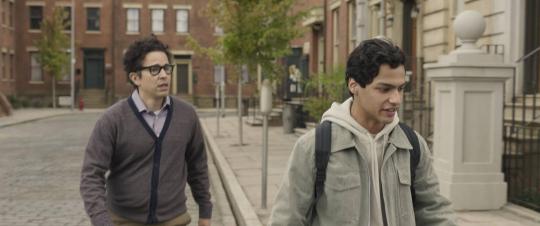
Summary: There is no handbook for what to do to take care of your mentally ill teenager. Well there was, and Elias has read them all, but most of the time he feels useless.
Three short dabbles exploring Elias’s relationship with his three boys, even if he doesn’t realize it.
Warnings: Mentions of suicide, self-harm, alcoholism, abuse
A/N: All conversation between characters take place in Spanish unless text is in bold
Kudos and Comments on AO3 appreciated. Reply and I'll tag you in the next chapter
It was a good day. One of those rare days where the air didn’t feel as heavy and it was a little easier to breathe. Long gone were the days the Spector family would attend Shabbat service together, back when Wendy used to hold onto the boy's hands to keep them in check. Nowadays, Elias was lucky if he even could convince Marc to go with himself rather than letting him sulk in his room all Sabbath. Marc's room felt so dark and gloomy most of the time Elias won’t be surprised if it started growing mushrooms.
While Elias never forced religion on his family, it was important to him, and hoped that Marc could find some comfort in it as well. The afternoon walks to and from the synagogue wouldn’t hurt.
“So how was school?” Elias always asks in Spanish. Half of the time Marc would simply reply with “I don’t remember” or “Nothing happened” but it was a safe question. Elias only asked safe questions.
“Good. We had a, ah, college fair? Like where the school invites a bunch of reps from different unis. I talked to one of those student reps from ISU about their anthropology department.” Marc replies cheerfully. Good, Elias lets out a sigh of relief that Marc is seemingly in a good mood. Sometimes trying to talk to Marc felt like he was talking to a brick wall, other times it felt like he was waiting for a bomb to go off, but sometimes it was… easy.
Following Marc's most recent hospitalization, the psychiatrist told him that she suspects a different diagnosis for Marc: Borderline Personality Disorder. As soon as the meeting with Marc’s care team ended, Elias had booked it straight to the library for any books on BPD. And by the time Marc was finally discharged from Putnam’s psychiatric ward, Elias had done enough research to write a thesis. At this point, Elias had gotten too good at reading psychology books despite not taking a single class on psychology. Elias was still hesitant, Marc’s diagnosis has changed from PTSD to depression to bipolar and now maybe BPD. It certainly didn’t help that apparently PTSD, bipolar, and BPD can all be comorbid. And that’s ignoring that Marc still hasn't gotten an official diagnosis for ADHD, despite it being a constant point of discussion with Marc’s teachers. His inability to focus was a red flag to everyone. Ultimately, it didn’t matter what diagnosis they gave him, as long as they could help his son. It’s not like Elias was able to support him in any meaningful way. No matter what he did, it would never be enough.
But even with this new hypothesis, Elias is unsure about the diagnosis. Marc was the picture definition for some of the symptoms: wild mood changes, intense anger, chronic feelings of emptiness, periods of paranoia and delusion, impulsive and risky behaviors, rapid changes in self-image and self-identity, and worst of all the self-harm and suicidal tendencies. He was embarrassed and saddened to admit how perfectly those symptoms described his son.
Other symptoms, however, Elias was more unsure about. Maybe Marc did have intense feelings of abandonment and that could explain the apparent lack of friends. According to one of the nurses, Marc did make a friend with another high school girl during his most recent stay but Elias secretly hoped that it wouldn’t progress to anything beyond an acquaintance. He wasn’t very comfortable with the idea of his self-destructive teen hanging out with another mentally ill teen.
However, none of the diagnoses, other than maybe the PTSD could explain all the gaps in memory. Elias could ask Marc simple questions about his day and he’d look at him like he was speaking in a foreign language. Sometimes he gets the impression that Marc doesn’t know his own name. He’d change his mind about little things faster than a politician running for re-election. Marc’s therapist believes it to be an avoidance tendency to steer clear from any meaningful and constructive conversations about his trauma but recently Elias has genuinely started to think that Marc is somehow really forgetting large chunks of time.
His more destructive symptoms started to manifest early, Elias knew the importance of savoring these moments, as the good days are few and far between. When Marc didn’t look like the weight of the world was crushing him. When it didn’t for the stars to align just see him smile.
“ISU is a good school. Your tití Nina’s daughter is going to graduate this year, you can talk to her about it,”
“Who?” He asks, almost sounding embarrassed.
“Kimberly? You remember Kim right,”
“Oh. Yeah. Maybe,” Marc sounds unsure but Elias doesn’t push it, he never does.
“What do you want to study?” he asks.
“History, maybe? Or Anthropology or Archeology? I don’t know yet. I still want to study egyptology but I don’t think they have that, mhm, how do you say ‘major’ in Spanish?” “Especialidad,”
“Yeah, I don’t think they have that major at ISU. But even so, the student rep I was talking to was telling me about how she’s doing a semester abroad in Taiwan. Maybe I can do that too and study in Cairo so that I can still build my focus around Egypt. The girl didn’t know if ISU has any partnerships with any unis in Egypt though, but she gave me the contact information of the study abroad counselor. Even so, they are other schools I can look into if they don’t have anything with Egypt,”
“Well, you still have plenty of time to decide. You just have to work hard to get in,” Marc's grades and academic performance were dramatically inconsistent but it’s to be expected when your kid was sick. Honestly, Elias was just ecstatic whenever Marc brought up college, better than he says that he’ll lie to get into the military and even better than he claimed that his future didn’t matter because he’d be dead before he turned 20.
“Yeah, alright. I was maybe thinking about taking an ACT/SAT prep class at the library over the summer…”
“That sounds like that a great idea. That’ll take you out of the house for a bit too,” Most of the time talking to Marc felt like he was walking through a minefield, one wrong step would cause the whole area to blow up. So Elias deliberately avoids mentioning his mother. If Marc brought it up, Elias usually follows but out of fear of making Marc upset, he avoided it as much as possible.
Marc simply nodded, not replying verbally.
“Just work hard to graduate high school. I’ll take you to Hawaii or Canún or somewhere to celebrate,” Elias says, hoping to inspire him and keep him motivated. Give him something to look forwards to.
“It’s not really ethical to visit Hawaii, did you know a large population of native Hawaiians are living in poverty–”
“It doesn’t have to be Hawaii,” Elias reassures him.
They pause for a bit before Elias tries again.
“Hey, what do you call a mummy covered in chocolate and nuts?” Elias asks after a minute, switching the topic.
“What?”
“A Pharaoh Roche,” he says with a smile. Marc snickers and rolls his eyes, but he smiles and that was enough.
The rest of the walk was filled with more small talk, and Elias couldn’t have asked for anything more. And on their way back, he’s thrilled that Marc wants to discuss the service with him.
When Elias and Marc returned home, Elias is surprised to find that Wendy is prepping the dinner table for them. Wendy had stayed in bed all day, ignoring all offerings of food or water, so he’d just assume he’d find her still in bed when he returned. It was even harder to predict and prepare for Wendy’s mood swings, and they typically result in even more destruction and pain, but she was coming up on 13 days sober and started going back to AA so maybe they could finally start to heal. Marc nervously preps a plate for Wendy and then himself consisting of vegetarian tamales with a side of rice and beans before taking a seat on the opposite side of the table. Even when things are calm, a sense of uneasiness still creeps through the house. Elias still sees how Marc tries to eat and make the least amount of noise and how avoids making eye contact with his mom as possible. Dinner carried on in silence.
“Marc?” It’s barely a whisper and initially, Marc doesn’t seem to acknowledge it. “Do you want dessert? I made piña Asada.” Marc nods quickly, finally looking up to meet her face. With that Wendy gets up, takes everyone’s empty dinner plate, and excuses herself to the kitchen.
She brings Marc back a plate of two perfectly grilled pieces of pineapple with a scoop of ice cream in the center and sets it down in front of him.
“Thanks,” it’s barely audible but Wendy still takes it as permission to give him a quick kiss on the forehead. Marc even smiled when he took his first bite. Watching the whole interaction was nerve-wracking, Elias expects the tables to turn at any second and is relieved that they don’t. This is probably the “best” interaction the two have had in years.
Many he’s naive to think it could stay like this; that Wendy would continue to attend AA and stay sober, that Marc would continue to take his medication and participate in therapy. But he’ll continue to pray.
#moon knight fanfic#moon knight#marc spector#steven grant#jake lockley#elias spector#wendy spector#oscar isaac#layla el faouly#marvel
6 notes
·
View notes
Text
Toxic Love Chapter 7

Pairings: Steve Rogers x Reader, Bucky Barnes x Reader, Steve Rogers x Reader x Bucky Barnes
Summary: Finding out your soulmates were Steve Rogers and Bucky Barnes was one thing. But when someone from your past comes back to haunt you, you have to figure out if a relationship with two super soldiers is something you really want to pursue or if you’d rather go back to your comfortable single life.
Series Warnings: 18+, Swearing, Angst, Fluff, past mentions of rape, self-harm, attempted rape, domestic violence, stalking, death threats, possible Dark!Steve?, Steve will be an asshole a LOT in this series but I don’t know how dark it will get, explicit sexual content, mental health issues, kind of A/B/O dynamics but not really (no they are not actual wolves, more like the hierarchy), mentions of suicide, flashbacks of suicide, nightmares
A/N: There will be no taglist for this story! I apologize in advance!
8 Years Ago – Age 17
“Y/N, do you know why you are here?” the shrink asked from across the large desk. You looked down at the typical uniform of a patient at a psychiatric ward. Yes you knew why you were in here. A few months ago you witnessed your father’s dead corpse hanging in your living room. The next thing you knew you were writing a suicide note of your own and your foster parents found it before you could do anything. Now, you were stuck in a psych ward, probably until you at least turned 18.
“Yep,” came your short response.
The shrink glanced down at her papers in front of her, going through all of your notes. “We want to help you as best we can Y/N. You’ve been through some very traumatic experiences in your life and you’ve witnessed a great deal. We are going to get you all the help you need.”
3 Months Later
“Have you heard of Borderline Personality Disorder Y/N?” your psychiatrist, Dr. Wang asked.
That made your head snap in her direction. Here you were, still stuck in the psych ward after three months and you weren’t sure why. “I’ve heard of that, yes. But I thought I was just depressed,” you mumbled, chewing on your fingernail.
You were clinically diagnosed with depression shortly after coming here.
“Well, that’s what we originally thought at first. But the longer you’ve spent time here, the more I and the rest of the staff have discovered it is BPD. You’re intense mood swings, combined with your ongoing feelings of emptiness and the intense bouts of anger you have are all signs of BPD. We are going to switch up your medications and that will really help with your mood swings and anger issues.
~~~
No matter how hard you tried, sleep never came to you that afternoon. You tossed and turned all afternoon in your bed and nothing seemed to be working. Not only that, but you were really starting to get more irritable as the day went on and you knew it was time to change the dosing of your medication. It was like clockwork, every year to year and a half. The only problem was that you couldn’t leave the tower without Steve, Bucky or an anyone else. How were you supposed to get an appointment with your Psychiatrist if you couldn’t leave the tower alone? This only increased your anger and frustration as you got out of bed to get ready.
You brushed your teeth and put on a some jeans and a t-shirt, not really caring what you threw on. All of the specific clothing you wore for work was in the closet of your game room along with your makeup and accessories.
Upon leaving your room, you saw Steve and Bucky sitting at the island in the kitchen of your shared apartment. They both looked deep in thought over some paperwork and you assumed it was for work.
Grabbing a bottle of water from the kitchen, you were about to head into the elevator as you didn’t want to disturb them, but Steve spoke up and caught your attention. “Where are you off to?”
“Oh, umm, I’m heading down to my game room. I’m going to work tonight,” you mumbled out as you pressed the button for the elevator. You noticed it was on the ground floor and it would take a few minutes to get to your level.
“What time do you plan on being done?” Steve questioned.
You huffed in annoyance, already irritated as anger began to creep through your bones. “I don’t know. Whenever I get done,” you snapped. Immediately you felt regret, but sometimes your emotions got the better of you when you were in dire need of a medication change.
“Hey, what’s with the attitude?” Steve commanded as he got up from his seat and stalked over to you, hands on his hips. You noticed Bucky looking at you from his seat with furrowed brows. They had never seen you angry like this. You were always so compliant and easy going.
“Look, I’m sorry. I’m just tired is all.”
Steve looked at you sharply, his lips in a thin tight line. “Alright. Just make sure you get to bed at a reasonable time tonight. Promise?”
“I promise,” you answered back.
~~~
In the comfort of your game room, you quickly got to work. Digging through your closet, you decided on a light pink tank top that said ‘Gamer Girl’ in black letters with two gamer controls on it. Since your webcam only showed your top half, you threw on a black pair of cotton shorts to be comfortable.
Next, you put your hair up in space buns, making sure they were situated just right so they wouldn’t be in the way of your headphones. You put on your typical game night makeup: bright pink eyeshadow with dark smoked out liner, some mascara and blush and you were good to go.
Turning on your monitor, you began to power everything up and once that was done, you logged in. Immediately your followers started putting in their messages off to the side and you smiled as you read them. You always tried to read as much of them as you could.
As the night went on, you knew you should pack it up and listen to what Steve said; getting to bed at a descent time and getting rest. But you were having way too much fun tonight and so were your followers. It was one of the best nights you’d had in months and not just money wise.
Ignoring the clock you continued to play and interact with your followers with the microphone that was attached to your headphones. Every so often you would glance to your messages box and see what some of them had said. Most of them were cheering you on but of course you always had some haters in there as well.
It was when you noticed the screen name of one of them that made your blood run cold. JSmith20. ‘It can’t be’ you thought to yourself, trying to keep as composed as possible as hundreds of people were watching you game in this very moment.
John’s last name is Smith and he always told you how his favorite number was 20, because that was how old you were when you met him. No, but he’s still in prison. He hasn’t gotten out. He’ll be in there for many more years to come. It had to be one of his friends right? The same friend that had been delivering those letters to your old apartment. ‘Yes, that’s right. It’s just one of his friends trying to torment you’ you thought to yourself.
Then, the person behind that screen name typed a message into your message box.
Hey babe. Do you miss me yet? I can’t wait to see you – J
Yep, your composure went out the window reading the message. Then another message from him popped up.
I see you are no longer living in that little one bedroom apartment. Did you really think you could up and move and I wouldn’t be able to find you? Oh babe, how cute. I will find you and we will meet again soon. I promise – J
As you stared at the words on your screen, you heard groans from the other players on your team. You had just lost the game.
“Shit,” you swore, anger bubbling up inside of you. “Fucking damnit!” You slammed your fist on the desk.
You rarely lost games. Losing always put you in a foul mood. But because of already being irritable and your emotions on over drive, losing just made everything worse.
Looking at the clock it was just before five in the morning so you logged off and shut everything down.
You took your hair out of the buns, immediately feeling the tension in your head ease. Ever so quietly, you opened the door and poked your head out into the hallway. It was bitch black so you used your phone as a flashlight and tiptoed to the elevator. Before pressing the button on the elevator, you paused. What if the noise of the elevator woke up Steve or Bucky? You had promised Steve that you would get to bed at a descent time and seeing as it was just about five in the morning, well, you kind of figured you’d be in trouble.
Instead, you opened the door to the stairs which was situated right next to the elevator. At least taking the stairs would be much quieter.
You climbed the stairs up a few levels until you reached your living level and you waited on baited breath for a few moments. Nothing. Nothing but silence. As quiet as a mouse, you snuck through the door and dashed to your room, thanking your lucky stars that the palm scanner didn’t make any noise.
You took a nice hot shower, washing off all of your makeup and the stress of the last few hours. As much as you wanted to forget John messaging you, it wasn’t going to happen, neither was any sleep.
Rather than even bothering to get into bed and try to relax, you sent an email to your psychiatrist letting her know that you would more than likely need a dose change on your medications. Frantically typing away at the email, you explained how you were beginning to get irritated and it was harder for you to control your bouts of anger.
Luckily for you, Dr. Wang was an early bird and she emailed you right back. She wanted you to come see her for an appointment and your heart immediately dropped. That wasn’t going to happen as one of your rules was that you weren’t allowed out of the tower by yourself. And as much as you liked Darcy, you couldn’t trust her to go with you and not say anything to Steve or Bucky.
Typing out your reply, you explained that you were unfortunately not able to meet in person and if there was anything else that could be done. After you hit sent, you began to pace in your apartment, clearly on edge with everything going on. You just wanted to feel better; you hated feeling this way. It was as if you weren’t in control of your body and you definitely weren’t in control of your emotions.
A notification came through your laptop and you rushed towards it, almost tripping over your feet. As you read her words, you could have cried right then and there. She had agreed to a phone call appointment and she had time right now to discuss things with you.
Grasping your phone, you dialed her number.
“It’s good to hear from you Y/N,” Dr. Wang stated as she answered the phone.
“Oh Dr. Wang it is so good to hear your voice.”
She let out a soft chuckle. “Yes, it has been a little over six months since we’ve last spoken. How are things going with you?”
“Where to begin,” you started off saying. You let her know that you indeed met your soulmates and had moved in with them. You went over the rules that Steve had given you and she made you feel better as she stated she had seen way worse rules. Hell, she said your rules were like a walk in the park compared to some she has heard.
“Alright, now, let’s get down to business. How are you feeling these past few days?” she asked curiously.
“Ugh, not good. Moving was stressful but I have been feeling really irritated over the last few and I’ve had a few bouts of anger rush through me that makes me want to punch something, but I’ve luckily been able to hold back on that.”
“What about any risky behaviors such as reckless driving, spending sprees, binge eating, drug abuse or sabotaging anything positive in your life?”
“Not yet,” you stated. You knew the routine. She was going over all the symptoms of Borderline Personality Disorder to see what has changed with you.
“Ok good. How about any intense fears of abandonment or rejection?”
That question always hit you like a punch to the gut. The only reason you had stayed with John for so long was because of that right there. He purposely wouldn’t let you see Dr. Wang or he wouldn’t take you to get your medications refilled and because of that, you were starting to feel those feelings; not wanting to be abandoned no matter what.
“Nope,” you replied.
“Ok then. I am going to increase the dosing on your current medications but I want to warn you. Without you coming in and personally seeing me and without getting some blood work done, I don’t know how well this dosing is going to work, if it will work at all. We might need to discuss changing the medication all together,” she stated.
“I understand Dr. Wang. And do you think maybe you could prescribe some sort of sleep medication for me too?”
“I can prescribe a one week trial of a sleeping medication for you. After that, I really need you to try and come see me in the office and we can discuss that further. Now, did you want me to send these prescriptions into your regular pharmacy?”
“Yes, that would be great. Thank you so much Dr. Wang.”
“No worries at all Y/N. Give the office a call and get an appointment set up.”
“I will. Thanks again.”
Now that you had your medications all taken care of, you had to figure a way to leave the tower so you could get them.
#steve rogers x reader#steve rogers x you#steve rogers fanfiction#steve rogers fanfic#steve rogers smut#bucky barnes x reader#bucky barnes x you#bucky barnes fanfic#bucky barnes fanfiction#bucky barnes smut#dark!steve rogers#dark! steve rogers
98 notes
·
View notes
Note
Hi (you don’t have to answer this if you don’t want to). For some time now I have been thinking a lot about myself and I think i’m autistic. I’ve done a lot of research in different websites and I want to talk to my mom about it to get rightfully diagnosed but i don’t know how to approach it, do you have any tips?
Hi! To be honest, I'm not sure how helpful I'll be... I had very little support from my parents growing up in terms of mental health care, and I received my autism diagnosis from my psychiatrist and therapist as an adult, although technically I don't have a "formal" diagnosis because the evaluation costs $2000 and I just don't have that kind of money.
However, that said, I think it's really good that you want to pursue diagnosis! If you feel comfortable discussing it with your mom I think it could be worth it to kind of start out with the symptoms (I don't really like that word, but I can't think of a better one right now) that you experience, and then bring up the possibility that it could be autism.
If you're already seeing a psychiatrist or therapist I would definitely recommend bringing it up to them, and if you aren't seeing someone yet, it would probably be worth it to find one that you can build a relationship with and discuss those issues with them.
What actually got me talking about autism with my therapist in the first place was I sent him a long email about all the ways I'd been struggling, and how long that had been going on - social issues, sensory issues, meltdowns, everything I could think of. It was... a very long email, lol. I didn't actually mention autism in the email, he was the one who brought it up at my next appointment, and then we kind of went from there.
I mention that last part because I know parents and doctors can sometimes accuse you of like... reading too much stuff online and then diagnosing yourself with things and looking for validation (which honestly I don't particularly see the problem with, especially considering the cost of healthcare in some places), but focusing on the symptoms rather than starting out by saying "I think this is autism" can sometimes be helpful.
I don't know how much of that made sense or was relevant... I was diagnosed with ADHD about 10 years before I was diagnosed with autism so a lot of those symptoms overlapped and led to it being maybe a more complicated and drawn-out process than it needed to be, and the lack of family support also didn't help. But if you're able to get support from your mom, and have the ability to meet with a therapist or psychiatrist, those are definitely the best first steps!
And advocating for yourself is so important - don't get discouraged if things don't move as quickly as you'd like, or if you have to try a few different therapists or doctors before finding one who will listen and work with you. It can be a slow process, but it's usually worth it in the end.
Finally, even if it does take a long time to get diagnosed, or it ends up being a difficult process, just remember that you are allowed to use all the resources out there for people with autism, even if you don't have the diagnosis! You can still stim and use sensory tools and calming techniques and whatever you need to feel better, regardless of whether you have a doctor or a piece of paper saying you "should." I am of the opinion that self-diagnosis is totally valid if it helps you to find ways to cope.
(Okay, I feel like I just used a lot of words and maybe didn't say much that was very helpful? And if so, I'm very sorry. But I do wish you the best and if I can be of any other help my ask box is always open!)
18 notes
·
View notes
Note
Hi, jess! A couple of months ago I sent you an ask about a reality tv show (the farm) and a participant who has bpd (she didn’t win the 1 million price, btw - but she was so happy when she found out that a good portion of the public supported her, specially women ❤️ she’s famous because of only fans and most of her followers on social media, before her participation on the show, were men. So she said she was happy to see so many women supporting and following her now). Anyway while watching the show, I realized many of her behaviors were so similar to mine. Then my mom and sister, who live with me, told me they noticed that too. I decided to ask my psychiatrist and psychologist (I’ve been dealing with depression for the past 10 years), but both didn’t give it much credit. At the time I agreed with them - they said I probably don’t have bpd because the behaviors I was describing only happens when I’m home, with people I trust. I’m very “controlled” when I’m with other people, including my dad (who hasn’t lived with me since I was a kid). The point is, I’m ALWAYS making a huge effort trying to control myself in public - it’s exhausting and I believe it’s one of the reasons I tend to isolate myself. I think I’ve actually learned to camouflage my feelings and to avoid things that trigger me. I used to be more “uncontrolled” as a kid, before I created this deep rooted fear that people’d leave me because of these behaviors and reactions. Do you think it’s possible to camouflage some of bpd’s symptoms? And, if so, do you have any tips on how I could talk to my psychiatrist and psychologist about it? —— I didn’t want to make this ask any longer than it already is, but one of my childhood friends was recently diagnosed with autism. We don’t talk much nowadays, but she messaged me last month to tell me about her diagnosis and to ask if I felt I had some of the same treats - thinking retrospectively, we were very alike. It made a lot of sense and I remembered you said sth about bpd and autism sharing some similarities in some aspects of how the brain works. She also told me about recent studies showing the underreported diagnosis in women. My psychiatrist and psychologist also dismissed it, because I don’t avoid eye contact and have friends. I’m really confused right now, but it’s also kinda relieving to get to know myself a bit more and to think that the struggle I’ve felt my whole life is real. (Sorry for the long text!)
Hey :) Sorry it’s taken me so long to get back to you. Just like to be able to dedicate a bit of time to longer messages like this and I rarely have the attention span for it! But of course I remember the conversation, it was really interesting to hear about what the contestant went through.
So yes, BPD and autism are often misdiagnosed as each other as there are similar traits that are often found. Usually around attractions to patterns and structure and also around empathy. Like I don’t generally feel empathy for people in the same way most people do. I’d say unless you’re a close friend or family member - or maybe if you’re a child - I probably wouldn’t feel empathy towards you. I generally make decisions about moral standpoints and such based on what logically makes sense to me rather than any kind of emotional connection because I just don’t really feel that. I think the reasons autistic people may sometimes struggle with empathy are different but to an external person would seem very similar so can often be confused.
To address your two points that made you unsure about the diagnoses, BPD is definitely highly interpersonal so it can change drastically depending on who you’re with. I can be friends with someone for quite a while and they have no idea but if I’m in a romantic or physical relationship with someone they’ll know within a few days. Romantic relationships are my personal trigger so they’re where I struggle the most. Then in terms of autism, lack of eye contact doesn’t really mean anything. I think that’s a common misconception people have but two of my cousins are autistic and they were both very outgoing and friendly, they were incredibly tactile, I didn’t notice them not looking me in the eye but I probably don’t look people in the eye much because that feels weird haha. Women in particular are not well studied when it comes to autism as you kind of mentioned. They are generally better at “masking” and so are often misdiagnosed or their condition isn’t picked up until well into adulthood. So even if you have friends and can look people in the eye it wouldn’t necessarily mean you wouldn’t fit the criteria.
I wouldn’t want to diagnose you with anything myself as I’m not a professional and I don’t know you personally. The DSM outlines the criteria for being diagnosed with BPD. You have to demonstrate at least five of the following and as with all mental illnesses they have to cause a significant impact on your ability to carry out your responsibilities and go through daily life:
Chronic feelings of emptiness
Emotional instability in reaction to day-to-day events (e.g., intense episodic sadness, irritability, or anxiety usually lasting a few hours and only rarely more than a few days)
Frantic efforts to avoid real or imagined abandonment
Identity disturbance with markedly or persistently unstable self-image or sense of self
Impulsive behavior in at least two areas that are potentially self-damaging (e.g., spending, sex, substance abuse, reckless driving, binge eating)
Inappropriate, intense anger or difficulty controlling anger (e.g., frequent displays of temper, constant anger, recurrent physical fights)
Pattern of unstable and intense interpersonal relationships characterized by extremes between idealization and devaluation (also known as "splitting")
Recurrent suicidal behavior, gestures, or threats, or self-harming behavior
Transient, stress-related paranoid ideation or severe dissociative symptoms.
Those are the criteria that would most likely be used to assess you. In the UK we can be diagnosed with depression and anxiety by a GP but have to go to a psychiatrist or psychologist to get a PD diagnosis. It sounds like you’ve already been in contact with them. I’m not too sure how it works where you are. Can you get a second opinion? Are there other doctors you could make an appointment with? Could you go private? I’m very aware of the fact that having the NHS in the UK means that my experiences are not applicable to everyone’s circumstances but for me when I first went to get help I was given meds and a depression and anxiety diagnosis and sent on my way. When that didn’t help I went back and got a higher dosage. And then it still didn’t help and finally I was kind of at rock bottom (or I thought so at the time) and needed help and so what I did on that occasion was have a friend accompany me into the room. They had created a list of things they’d seen me do or heard about me doing that were concerning to them and gave them to the doctor, and they kind of backed me up and gave me moral support. It shouldn’t have taken someone else being in the room for me to be taken seriously but having someone there who could express what I might have been too shy or self conscious to say was really helpful. In the end I got referred for treatment and it wasn’t right for me ultimately as my problems were more complex but it helped for a bit. I don’t know if there’s anyone in your life you trust to be able to be there to support you but I think it can be really intimidating to push back with doctors and professionals and having someone there who knows you and cares about you can be the thing that gives you that extra bit of courage you need.
I’m not sure how helpful that is but I’m available if you want to ask me any questions about BPD or any explanations of how I experience the symptoms or anything like that :)
#ask#anon#non royal#mental health#mental illness#actually bpd#actually borderline#bpd#borderline personality disorder
11 notes
·
View notes